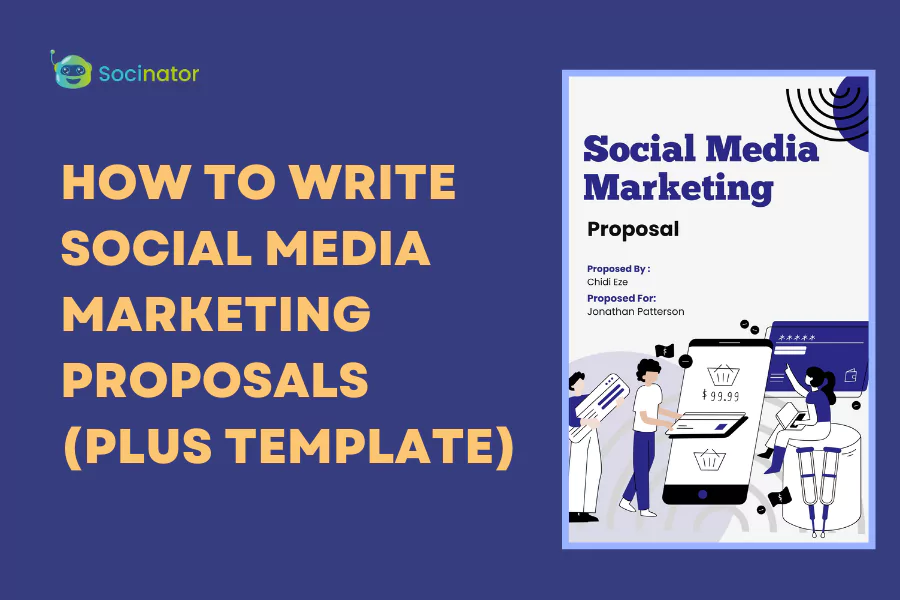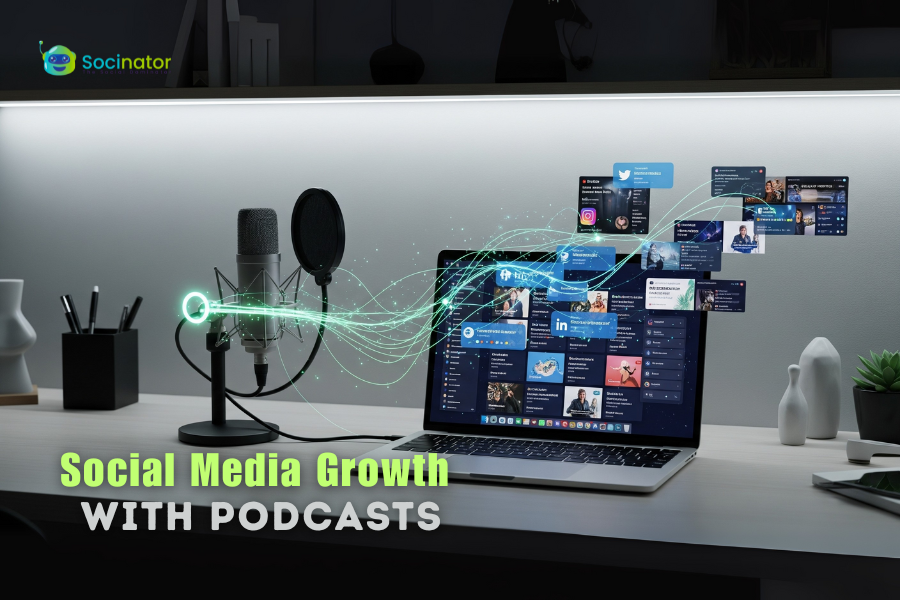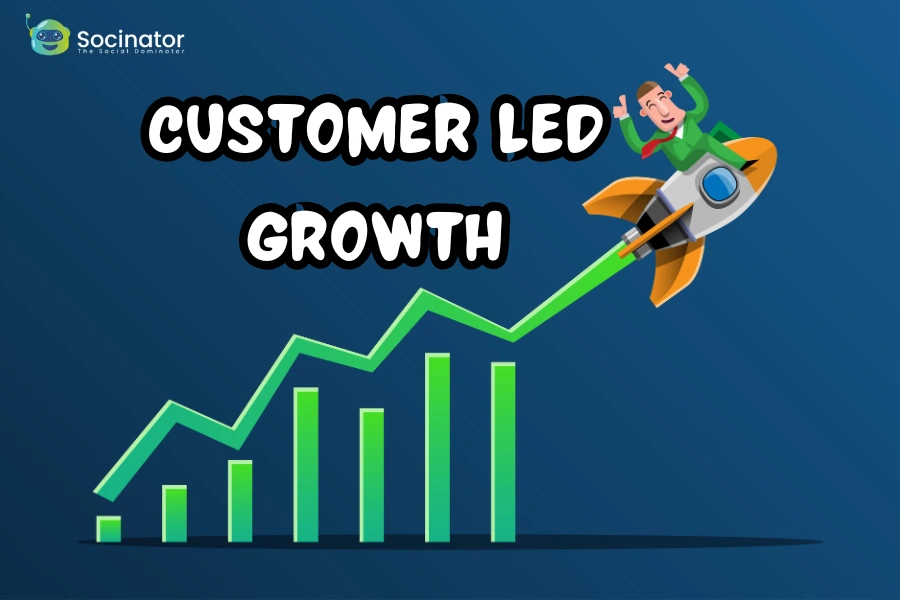Creating a compelling social media marketing proposal is crucial for freelancers and agencies looking to secure clients and demonstrate their expertise. It acts as the initial step in understanding client needs and crafting strategies that align with their goals. By offering a clear vision, the proposal sets the foundation for a comprehensive social media plan, outlining targeted tactics and content types that are tailored to meet the client’s objectives.
This blog will guide you through the key components of a social media marketing proposal, helping you craft one from scratch or customize it to suit your client’s unique needs. Whether addressing basic goals or suggesting advanced solutions, these best practices will equip you to form valuable client partnerships.
Listen To The Podcast Now!
What Is A Social Media Marketing Proposal?
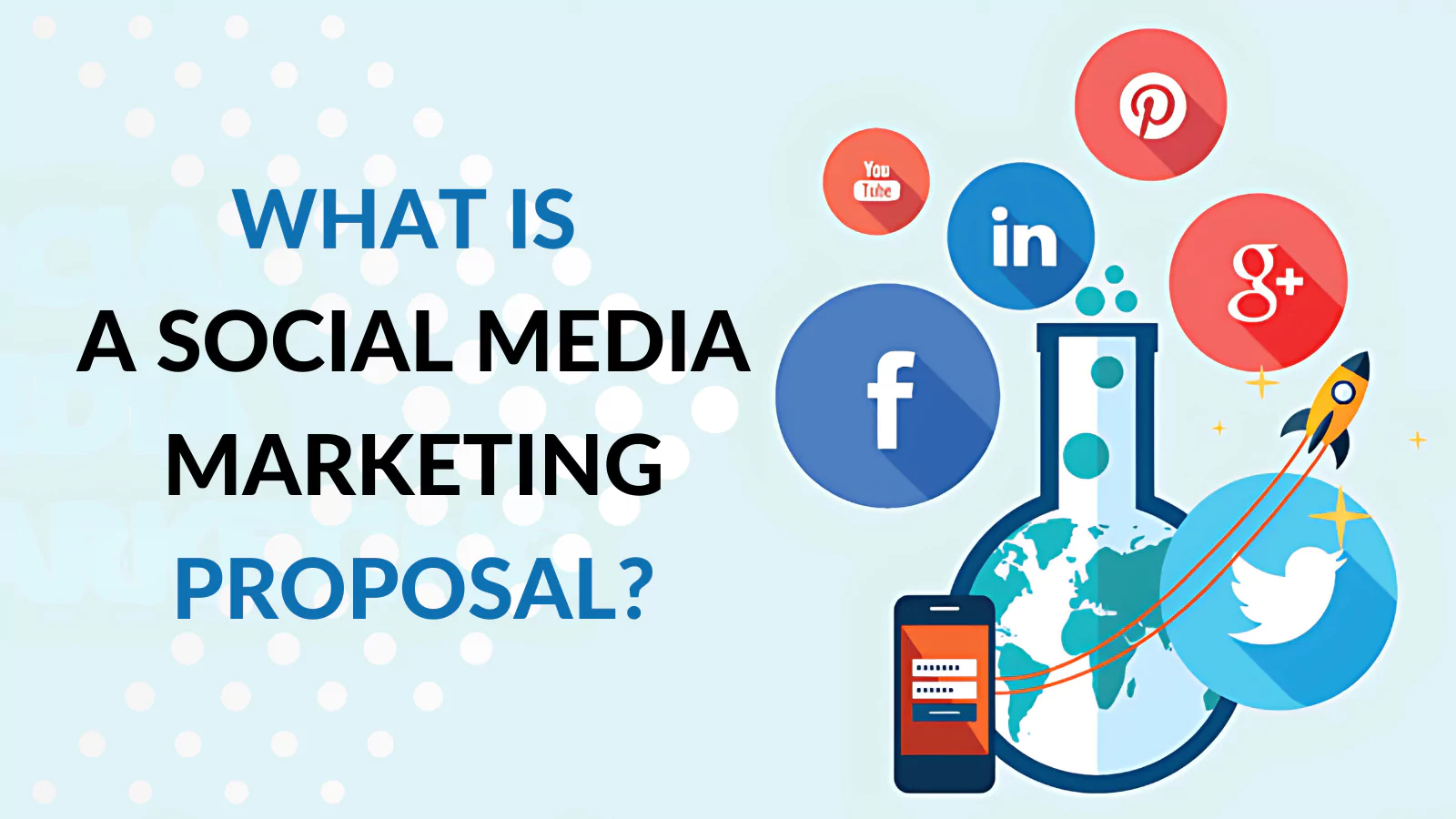 A social media marketing proposal is a comprehensive document demonstrating how your expertise and strategies can help potential clients achieve their business and social media goals. It clearly outlines the proposed terms, scope of work, deliverables, timeline, and budget, offering a transparent foundation for collaboration.
A social media marketing proposal is a comprehensive document demonstrating how your expertise and strategies can help potential clients achieve their business and social media goals. It clearly outlines the proposed terms, scope of work, deliverables, timeline, and budget, offering a transparent foundation for collaboration.
Before creating a proposal for social media marketing, it’s crucial to engage in a consultation with the prospective client. This conversation helps you understand social media’s role in their business, identify the challenges they face, and pinpoint the steps needed to reach their goals effectively.
Why Do You Need A Social Media Marketing Proposal Template?
Getting started with a social media marketing proposal is easier when you have a ready-to-use template at hand. A well-structured template ensures you cover all the essential aspects, from outlining social media goals to specifying agreement terms.
With a customizable template, you can simply fill in the details tailored to your client’s requirements and make adjustments as needed. This approach streamlines the process, helping you present a polished and professional proposal that aligns with your client’s expectations.
Example Of A Social Media Marketing Proposal
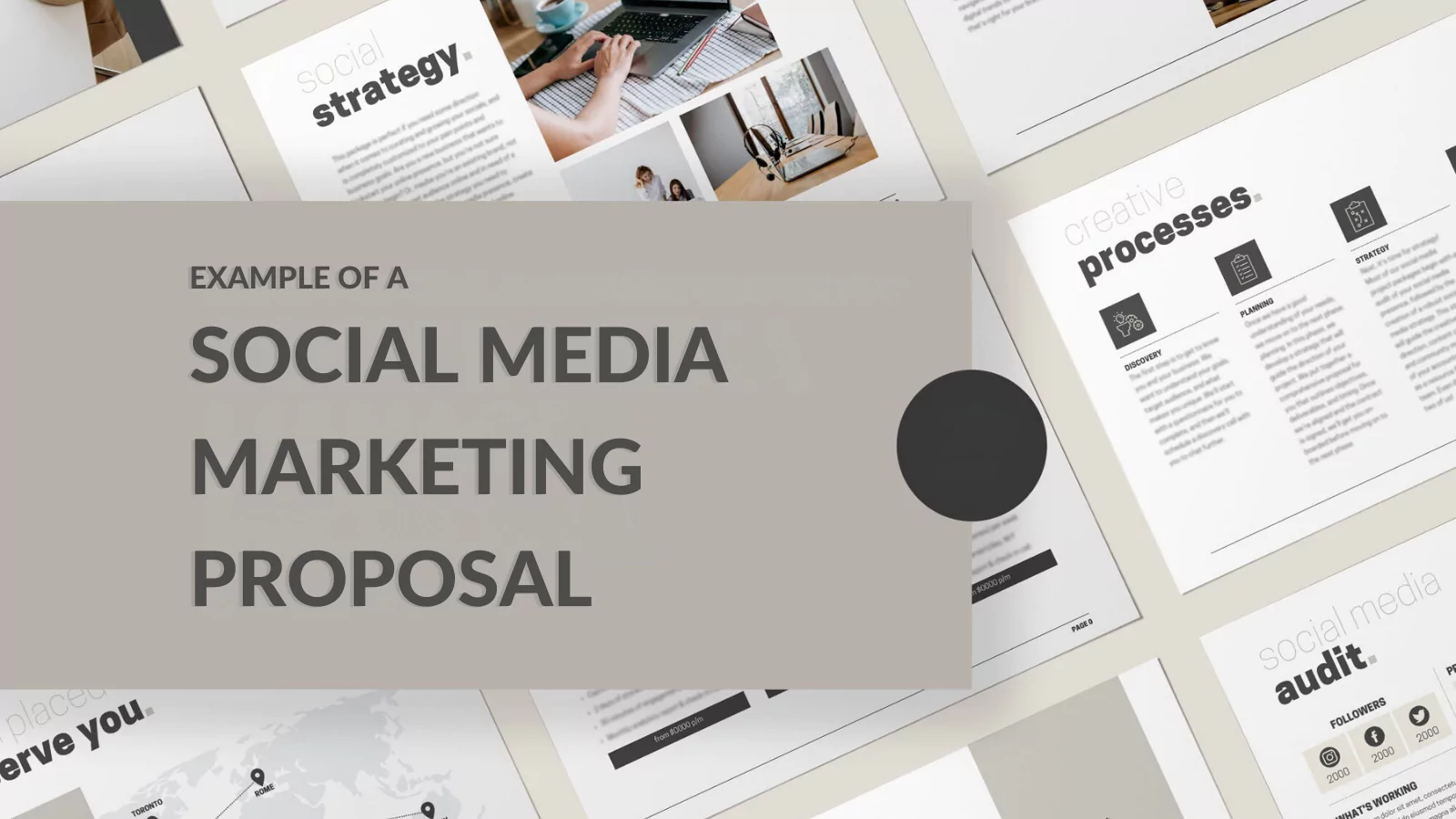 How does a social media marketing proposal work in practice? Consider a business that aims to grow its social media followers to generate more leads. To achieve this, they may seek the help of a social media strategist or agency and issue a request for proposals (RFP).
How does a social media marketing proposal work in practice? Consider a business that aims to grow its social media followers to generate more leads. To achieve this, they may seek the help of a social media strategist or agency and issue a request for proposals (RFP).
In your proposal, you would highlight your experience with similar clients, showcasing how you’ve helped them gain followers and achieve measurable results. Additionally, you would outline proposed strategies and activities tailored to their goals.
The challenge lies in persuading the client of your expertise without revealing every detail of your strategy. By presenting a concise, value-driven proposal, you demonstrate your knowledge, skills, and understanding of their needs, encouraging them to collaborate with you rather than attempting to execute the plan independently.
PDF TEMPLATE
Where Does A Social Media Marketing Proposal Fit Into Your Workflow?
 A social media marketing proposal plays a vital role in your sales process. It serves as a persuasive tool to demonstrate your expertise and build trust with potential clients—an essential factor, considering that 60% of customers may initially decline before agreeing to move forward.
A social media marketing proposal plays a vital role in your sales process. It serves as a persuasive tool to demonstrate your expertise and build trust with potential clients—an essential factor, considering that 60% of customers may initially decline before agreeing to move forward.
The sales process usually consists of several stages, including prospecting, presenting solutions, and finalizing deals. These stages can be visualized as a funnel, flowchart, or cycle, depending on the approach your business takes. While the structure may vary, what’s most important is having well-defined actions and metrics at each stage to ensure clarity and consistency.
For example, during the “conversion” stage, a streamlined process could look like this:
- Draft the proposal to address the client’s specific needs.
- Share the proposal with the client for review.
- Respond to client feedback or questions.
- Make revisions if required.
- Gain client approval on the revised proposal.
- Prepare and send the contract.
- Finalize the agreement with the client’s signature.
A clear and structured workflow enhances professionalism and makes the process more manageable and efficient. This approach saves time and increases your chances of securing valuable partnerships.
What To Include In Social Media Marketing Proposals?
 A well-crafted social media marketing proposal should demonstrate your understanding of the client’s needs and highlight your expertise. While proposals may vary by client, here are the essential components to include.
A well-crafted social media marketing proposal should demonstrate your understanding of the client’s needs and highlight your expertise. While proposals may vary by client, here are the essential components to include.
Cover Letter
A brief introduction expressing gratitude for the client’s time and interest. It should include your contact information, social media links, and website URL, either within the proposal or as part of the email sending it.
Executive Summary
Start with a concise summary that outlines the challenges the client is facing and previews how you’ll address them. Briefly mention the budget and expected results to give the client an overview.
Business Objectives
Show that you understand the client’s broader business goals. This could include objectives like building brand credibility or increasing sales. Make sure to distinguish these from their social media-specific goals.
Social Media Goals
Identify the client’s social media goals, such as growing followers or improving engagement. Also, outline any challenges they face in reaching these goals.
Analysis and Audits
This section shows the client’s current social media standing and highlights key obstacles. You may include a competitive analysis, industry insights, and a review of their existing social media performance.
Scope of Work
Describe the activities you will undertake to meet the client’s objectives. Each task should be linked to a specific goal, showcasing how you’ll help them reach their targets.
Schedule and Budget
Provide a timeline for each deliverable. For larger projects, break the schedule into clear milestones. The budget section should explain the costs and outline the total price for the project.
Key Performance Indicators (KPIs) and Evaluation
Specify how you will measure success, through engagement rates, follower growth, or conversions. Link these KPIs directly to your client goals. Also, mention how you will report performance to them.
Testimonials or Endorsements
Include testimonials, case studies, and endorsements to prove your expertise and convince the client of your ability to deliver results.
Contract or Terms of Agreement
Outline the terms, including scope, timeline, fees, and other important details. It’s essential to consult legal professionals to draft a contract that protects both you and the client.
Next Steps
Clarify what will happen after the client reviews the proposal. Mention the follow-up steps, whether it’s a meeting to discuss the proposal or signing the contract.
Appendix
This section includes additional materials like charts, sample campaigns, or other relevant data. Not all proposals need an appendix, but it can help provide more context when necessary.
These are the key components of a successful social media marketing proposal. Tailoring them to your client’s specific needs will give you a strong chance of securing the project.
Also Read,
7+ Types Of Social Media Content You NEED To Post
How To Build Successful Social Media Marketing Plan For 2024
How To Write A Social Media Marketing Proposal That Stands Out?
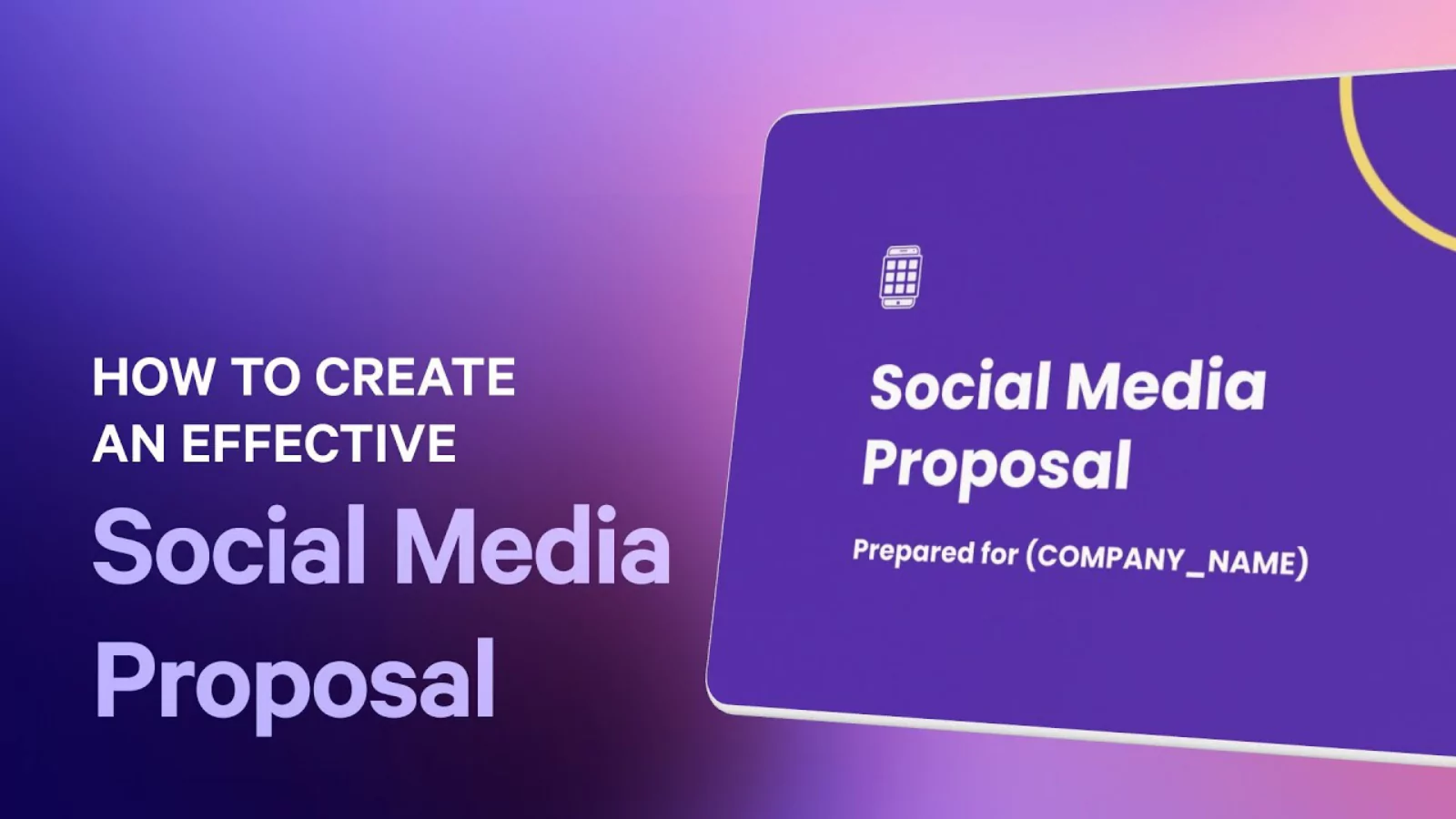 A well-written social media marketing proposal can set you apart from the competition and convert prospects into clients. Here is how to create a proposal that makes an impact:
A well-written social media marketing proposal can set you apart from the competition and convert prospects into clients. Here is how to create a proposal that makes an impact:
1. Illustrate Your Client’s Needs with Analysis
Managing your client’s expectations begins with understanding their needs. Lead your proposal with an analysis that highlights the challenges they face. Here are several types of analyses to include:
- Audience Analysis: If your client struggles with engaging their ideal audience, then an audience analysis is essential. This involves the review of the demographic, psychographic, and behavioral characteristics of their followers to determine the best strategies for engagement.
- Competitive Analysis: For clients aiming to outperform their competitors, a competitive analysis helps identify industry leaders and discover how your client can stand out. Analyze your competitor’s strengths and weaknesses to position your client effectively in the market.
- Industry and Landscape Analysis: For clients entering a new industry, this analysis helps them understand market trends, customer expectations, and key competitors. It also identifies opportunities for differentiation.
- Current Status Analysis or Audit: Some clients may benefit from a social media audit that evaluates their existing content and performance. This serves as a benchmark, showing what has worked and where improvements can be made.
Incorporate these analyses into the proposal to offer a comprehensive overview of the client’s needs. For example, if your client aims to increase sales through social media, this section should include their current sales metrics and identify why their current strategy is not producing results.
In your proposal template, break this analysis into a clear overview of the client’s challenges, the goals you plan to achieve, and the project timeline. Depending on the scope, customize the proposal’s sections to provide further insights or adjust the layout for clarity.
By starting with a well-rounded analysis, you not only demonstrate your expertise but also build a strong foundation for the rest of the proposal.
2. Get Into The Fine Details With The Scope Of Work
The scope of work is the heart of your proposal, where you clearly outline all the deliverables and set the stage for expectations. This section should provide a thorough yet concise overview of the services you will provide. It will address everything from content creation to campaign execution. It’s vital to explain how each task aligns with the client’s goals and how your approach will make their objectives a reality.
The goal is to provide enough detail to help the client understand what you’ll be doing, without overwhelming them with technical jargon. A well-defined scope of work demonstrates your professionalism and shows that you’ve carefully considered every step of the process.
Using tools like Socinator can streamline your social media management, allowing you to easily schedule posts, track engagement, and generate performance reports. This helps keep everything organized and ensures that social media tasks are efficiently handled. With these capabilities, you can focus on delivering high-quality work while maintaining clear communication and setting realistic expectations throughout the project, giving both you and your client peace of mind.
Socinator: Automate Your Social Media Management
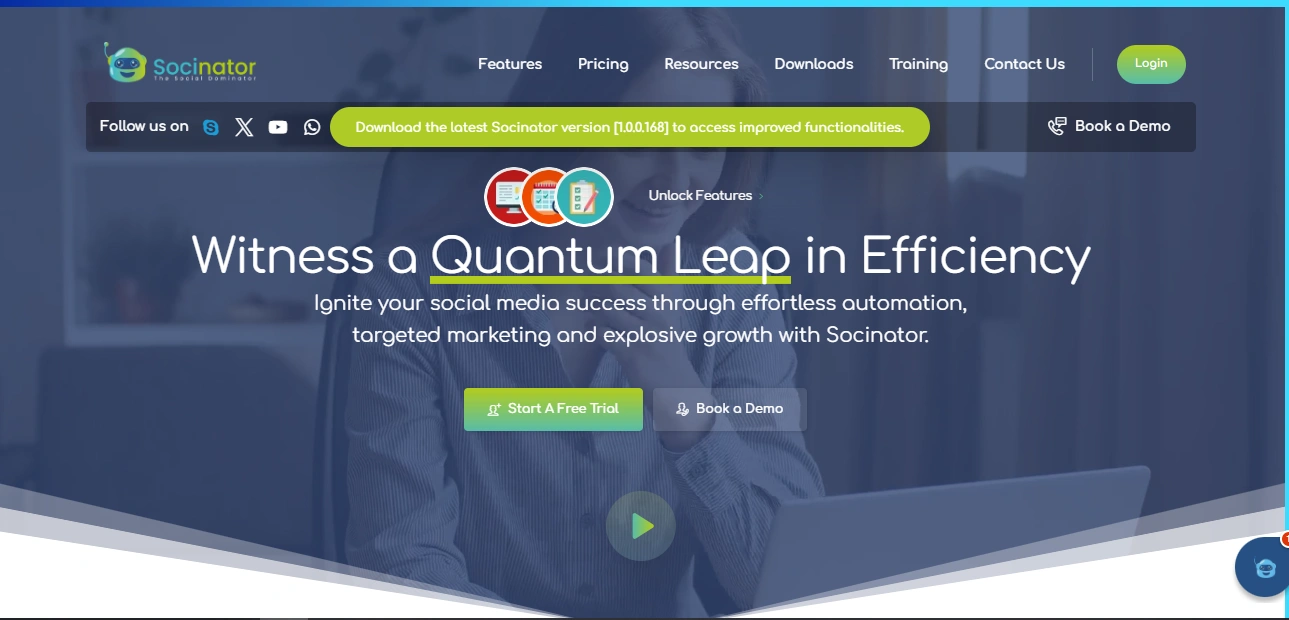 In the fast-paced world of social media marketing, automation is the key to efficiency and success. Socinator offers powerful automation tools that help streamline social media management tasks so you can focus on driving meaningful results for your clients. Below are five key features that make Socinator a game-changer for your social media marketing proposal.
In the fast-paced world of social media marketing, automation is the key to efficiency and success. Socinator offers powerful automation tools that help streamline social media management tasks so you can focus on driving meaningful results for your clients. Below are five key features that make Socinator a game-changer for your social media marketing proposal.
Key Features of Socinator for Social Media Automation
Automated Post Scheduling
Socinator allows you to schedule posts across various social media platforms, ensuring content is shared at optimal times without manual intervention. It saves you valuable time and maintains a consistent presence.
Auto Engagement Tools
The platform automates likes, comments, and follows across different channels. This feature boosts user engagement by interacting with your audience even when you’re offline.
Advanced Targeting and Audience Growth
Socinator’s automated targeting helps you identify and engage with the right audience, expanding your reach and increasing followers on multiple platforms.
Content Curation Automation
Socinator assists in automating content curation by sourcing relevant posts, ensuring your social media accounts are always up-to-date with the latest industry trends without requiring manual input.
Real-Time Analytics and Reporting
The platform provides automated performance reports, tracking engagement and other key metrics. You can adjust your strategy based on these insights, streamlining your overall content management efforts.
These features not only streamline your workflow but also ensure higher engagement and efficiency across your social media channels.
3. Create Project Milestones, Deadlines, and KPIs
When creating project milestones, deadlines, and KPIs for a social media proposal, clearly define the specific goals you want to achieve and establish measurable checkpoints. For each milestone, set clear deadlines, such as weekly, monthly, or quarterly, to track progress. Also, specify the KPIs that will be used to measure success, such as engagement rates, follower growth, or website traffic. For example, if brand exposure is the goal, you could track metrics like impressions, shares, and reposts. It gives the client a clear view of expectations and success criteria.
4. Highlight Your Unique Value Proposition
To stand out from your competitors, showcase your unique value proposition by demonstrating how your experience aligns with the client’s needs. Provide evidence such as client testimonials, case studies, and performance reports that highlight your past successes. Share specific results, like follower growth, to show the measurable impact you have made in similar projects. It is where you prove that you are not just another service provider but the right choice for their business.
5. Protect Both Parties in the Terms of Agreement
The terms of the agreement define the working relationship, including key details like:
- Fees: Outline whether the payment is based on the project, hourly, or retainer.
- Billing Practices: Specify how invoices are issued and the payment terms, such as deposits.
- Working Hours and Location: Clarify remote or on-site work and availability for communication.
- Termination: Define how either party can terminate the project, along with any kill fees or conditions that protect both parties if the project isn’t successful.
6. Provide the Next Steps for the Client
Clearly define the steps after the proposal is submitted to avoid confusion. This includes setting expectations for follow-up, such as a timeline for when you will check in or if the client can request revisions. These steps will ensure the client knows when to expect communication and what the next steps in the process are. By providing clear direction, you keep the momentum and maintain a professional workflow.
Social Media Marketing Proposal Template
To craft a compelling social media marketing proposal, use a customizable template that includes all essential sections such as client objectives, strategy, scope of work, and timelines. By logging into your Google account you can personalize the template with details specific to your client. This format will help you structure your proposal and make your writing informative and engaging while ensuring you cover all the critical points that clients expect.
PDF TEMPLATE
Wrapping Up
In conclusion, crafting a solid social media marketing proposal is essential for business growth. By focusing on an effective social media management proposal and utilizing the right tools, like social media management software, businesses can streamline their strategies for success. Integrating social media automation with a reliable platform such as Socinator allows for effortless management, scheduling, and tracking, all while saving valuable time. By doing so, businesses ensure their social media efforts are efficient and impactful, helping them stay ahead in today’s competitive digital landscape.
FAQs
- What are the benefits of a comprehensive social media management proposal?
A comprehensive social media management proposal helps businesses outline clear strategies, goals, and expectations, leading to better social media marketing outcomes. It ensures alignment with clients’ needs and expectations, providing a structured approach to social media management and automation. This kind of proposal is key for maintaining long-term success with social media management strategies.
- How can a social media marketing proposal improve engagement on social platforms?
A well-crafted social media marketing proposal identifies goals that boost engagement, leveraging social media management tools for optimal results. By aligning social media marketing efforts with a strategic plan, businesses can effectively target audiences, ensuring consistent growth and engagement. Including social media automation enhances efficiency and engagement tracking.
- How does social media management software support the execution of proposals?
Social media management software is crucial in executing a social media management proposal by automating tasks such as scheduling and reporting. This software makes it easier to follow the outlined strategies in the social media marketing proposal, ensuring that marketing goals are consistently met and providing insights for future campaigns.
- What should be included in a social media management business proposal for long-term success?
A solid social media management business proposal should focus on long-term strategy, including content creation, scheduling, engagement tactics, and analytics. Incorporating social media marketing tools and automation ensures that the plan is scalable, efficient, and adaptable to changes in the digital landscape.
- Can social media automation tools help with proposal implementation?
Yes, social media automation tools streamline the tasks outlined in a social media management proposal by automating content scheduling, audience engagement, and performance tracking. Tools like Socinator can enhance your social media management efforts, ensuring that the strategies laid out in the proposal are executed smoothly and effectively.

